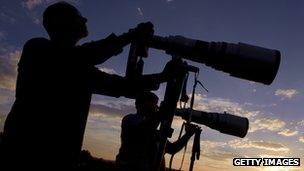Analysis: Royal Family and the media
- Published
The relationship between the Royals and the media has always been a delicate one. Ideally it is symbiotic. When it becomes parasitic, the Royals hit out.
In the early 1980s, according to Royal author Robert Lacey in "A Brief Life of the Queen", the monarch invited the editors of Fleet Street to discuss what might be done to alleviate the pressure the Princess of Wales was feeling at the hands of the media.
On one occasion she had been photographed buying sweets in a village shop.
"If she wants to buy wine gums", argued the editor of the News of the World, "she should send a servant to get them". To which the Queen responded: "That is an extremely pompous remark."
A few years later the Privacy Act was introduced but it didn't stop the paparazzi hounding Princess Diana, especially abroad, and, ultimately, their pursuit of her contributed to her untimely death.

The Royal Family have had a long, and sometimes fraught, relationship with the media
Against this background, according to royal author Penny Junor, Prince William has become an expert at Privacy Law.
He is especially protective of his wife.
While she is hailed by some - including veteran Sun royal photographer Arthur Edwards - as "the New Diana", that must be exactly what the prince does not want.
He does not want Kate to have to suffer the relentless camera intrusion his mother did. When she was still plain Kate Middleton he complained about the intrusion she was getting when she was simply trying to get to work.
The couple did not take action against the Australian publication which printed photos of them on honeymoon.
Now though, "a red line has been crossed" according to Palace officials. The gloves, it would seem, are off.
The couple have not hidden their desire to start a family, a development which would mean media interest becoming more acute than ever.
Maybe their hard line reaction to this affair is in anticipation of when that time comes.
- Published14 September 2012
- Published14 September 2012